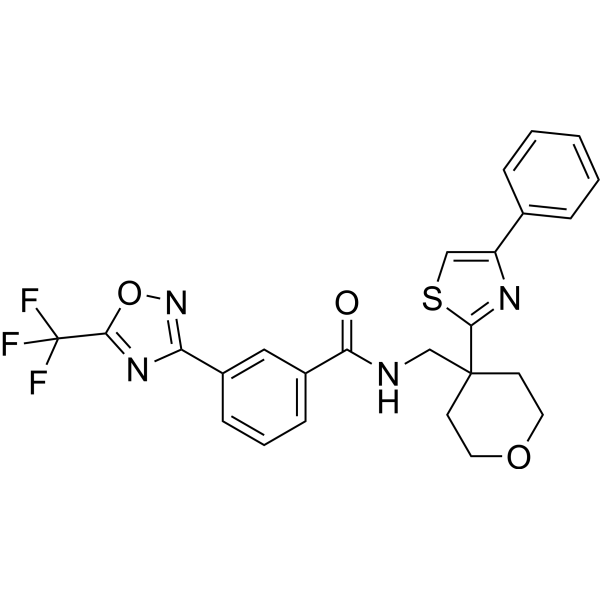Home
Products
TMP269



| Product Name | TMP269 |
| Price: | Inquiry |
| Catalog No.: | CN00127 |
| CAS No.: | 1314890-29-3 |
| Molecular Formula: | C25H21F3N4O3S |
| Molecular Weight: | 514.52 g/mol |
| Purity: | >=98% |
| Type of Compound: | Alkaloids |
| Physical Desc.: | Powder |
| Source: | |
| Solvent: | Chloroform, Dichloromethane, Ethyl Acetate, DMSO, Acetone, etc. |
| SMILES: | O=C(c1cccc(c1)c1noc(n1)C(F)(F)F)NCC1(CCOCC1)c1scc(n1)c1ccccc1 |
| Contact us | |
|---|---|
| First Name: | |
| Last Name: | |
| E-mail: | |
| Question: | |
| Description | TMP269 is a novel and selective class IIa histone deacetylase (HDAC) inhibitor with IC50s of 157 nM, 97 nM, 43 nM and 23 nM for HDAC4, HDAC5, HDAC7 and HDAC9, respectively. |
| Target | HDAC9:23 nM (IC50) HDAC7:43 nM (IC50) HDAC5:97 nM (IC50) HDAC4:157 nM (IC50) HDAC8:42000 nM (IC50) HDAC6:82000 nM (IC50) |
| In Vitro | TMP269 has no impact on the mitochondrial activity and/or the viability of human CD4+ T cells at 10 μM, and may be used as tools to identify the endogenous substrates of the class IIa HDAC enzymes[1]. In IEC-18 intestinal epithelial cells, TMP269 prevents cell cycle progression, DNA synthesis, and proliferation induced in response to G protein-coupled receptor/PKD1 activation[2]. As with HDAC4 knockdown, TMP269 significantly enhances cytotoxicity induced by CFZ in MM cell lines, upregulating ATF4 and CHOP and inducing apoptosis. TMP269 does not hyperacetylate histone H3K9 or α-tubulin in MM cell lines, confirming that it has no inhibitory effects on class I or IIb HDACs. In a dosedependent manner, TPM269-induced cytotoxicity is associated with cleavage of caspase-8, -9, -3 and PARP, consistent with apoptosis[3]. |
| Cell Assay | Human CD4+ T cells are isolated from whole blood via negative selection according to manufacturer's instructions (RosetteSep Human CD4+ T cell enrichment kit), re-suspended in T-cell culture medium (10% FBS, 2 mM L-glutamine, 1 mM pyruvate, 10 mM HEPES, 10 U/10 mg penicillin/streptomycin, 0.5% DMSO in RPMI) and plated at 50,000 cells/well with IL-2 (10 BRMP units/mL) and 100,000 human T-expander Dynabeads for 72 h. Determination of mitochondrial function or cell viability is done according to manufacturer’s instructions (Cell Proliferation Assay Kit I (MTT)) and is represented as a percent of control (no inhibitor) wells. |
| Density | 1.3±0.1 g/cm3 |
| Exact Mass | 514.128662 |
| PSA | 121.87000 |
| LogP | 5.81 |
| Storage condition | -20℃ |